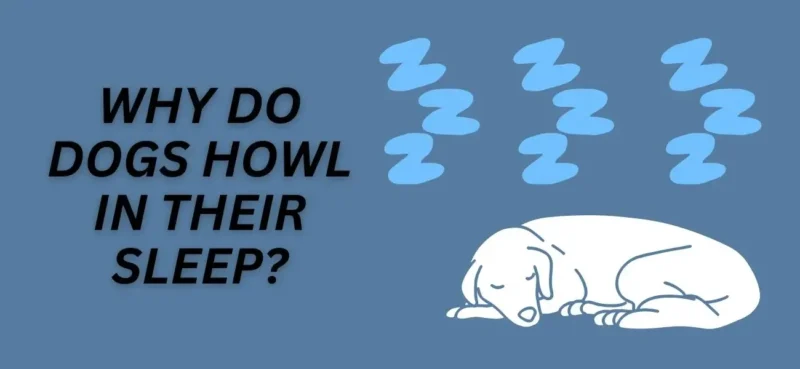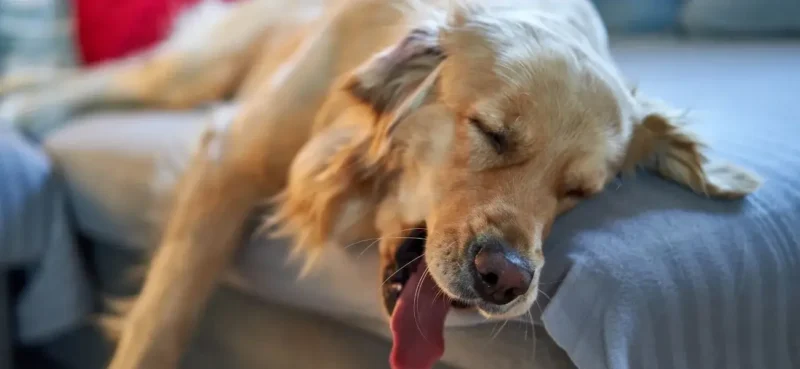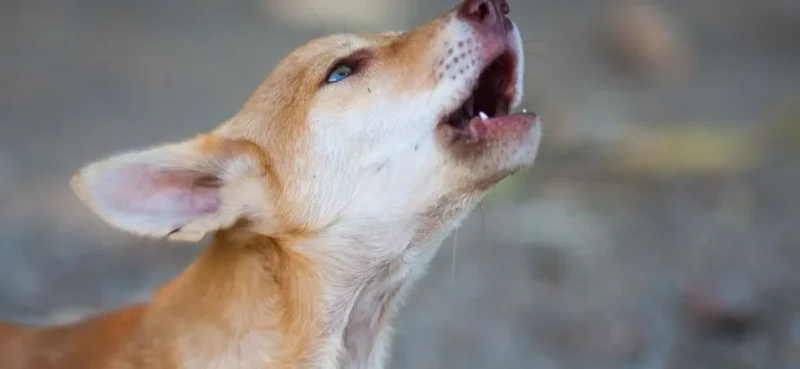Have you ever heard your furry friend making strange sounds like howling or whimpering while they’re deep in sleep? It can be a scary sound that might leave you feeling confused or even a bit concerned. You might wonder if this behavior is usual or if it could signify something more serious. As a dog owner, I’ve seen this firsthand; my own dog sometimes lets out a great big howl in the middle of the night, leaving me both intrigued and puzzled.
It turns out, just like humans, dogs can enter REM sleep, where they experience dreaming and react to imaginary scenarios. While they may be moving or reacting to their dreams, it’s generally a harmless act. However, if the howling becomes frequent or if your dog seems distressed, it might be wise to consult a vet to rule out any potential health issues. Understanding the root cause of this phenomenon can help us appreciate our dogs’ emotional and physical well-being, as well as their unique needs.
UNDERSTANDING DOG SLEEPING BEHAVIOR
When it comes to understanding why dogs howl in their sleep, it’s helpful to know about their sleep phases. Just like humans, dogs experience different stages of sleep, including Slow-wave sleep (SWS) and Rapid Eye Movement (REM).
SLOW WAVE SLEEP
During SWS, dogs lie very still, their eyes closed and muscles relaxed. Sometimes, they even snore! This stage is the deepest stage of their sleep cycle and is important for their mental and physical well-being. In this phase, growth hormones are released, helping with tissue and bone repair. Brain waves are slow and rhythmic, making it difficult to wake them up. For your dog’s best interest, it’s best not to disturb them during this time.
RAPID EYE MOVEMENT
The Rapid Eye Movement (REM) phase is where the magic happens. If you notice your dog’s eyes moving rapidly, or their legs twitching, it means they are likely in the dreaming phase. This stage is boosting their mental health as they process emotions and memories. Dogs can even learn new things during REM sleep! In this phase, brain waves become fast and irregular, and your dog may engage in vocalization, like whines, barks, or other noises. This is often when you hear howling. Some dogs might even show signs of sleepwalking! This REM stage is more prominent in puppies and tends to decrease with age. If their sleep activities become extremely disturbing for you or your neighbors, it’s best to leave them undisturbed.
WHY DO DOGS HOWL IN THEIR SLEEP?
Understanding the reasons behind this behavior can help us appreciate our furry friends even more. Here are some reasons why dogs might howl while they’re sleeping:
QUICK OVERVIEW
| Category | Details |
|---|---|
| Medical Issues | Howling can result from pain (arthritis, injuries), confusion (dementia), or distress (heart disease, breathing issues). Anxiety or seizures may also trigger howling. |
| Bad Bedtime Routine | Inconsistent sleep, overstimulation, or an uncomfortable bed can cause stress, leading to howling. A calming routine helps improve sleep quality. |
| Dreams | Dogs howl during dreams, reenacting daily activities or pack behavior. Muscle atonia limits movement, but vocalizations like howling may still occur. |
| Instinctual and Ancestral Factors | Dogs inherit howling instincts from their wolf ancestors. Even in sleep, they may react to environmental cues, reflecting their wild heritage. |
| Sensory Triggers | Loud noises, like sirens, can disrupt a dog's sleep, triggering howling. Dogs’ sharp hearing makes them more sensitive to distant sounds, even while dreaming. |
| Anxiety Issues | Anxiety can cause dogs to howl, cry, or bark during sleep. Stressful days or emotional distress may lead to restless nights and vocalizations. |
MEDICAL CONCERNS
When dogs howl in their sleep, it can sometimes indicate an underlying medical condition. As a dog owner, I’ve seen my own furry friend make strange noises that had me concerned. Understanding the possible medical issues behind this behavior can help us provide the right care for our beloved pets. Here are some common reasons that might cause a dog to howl during sleep:
- Pain or Distress: If a dog is experiencing pain, it may howl as a way to express their discomfort.
- Confusion: Conditions like canine dementia can create a confusing state of mind that leads to howling.
- Frustration: Dogs with separation anxiety might feel frustrated at night, causing them to vocalize their feelings.
- Chronic Pain: Ailments like arthritis can lead to chronic pain, making it hard for a dog to rest comfortably.
- Canine Cognitive Decline: This condition is similar to dementia in humans and can lead to disturbances and vocalizations during sleep.
- Heart disease: This condition affects the heart’s ability to pump blood effectively, leading to pain and discomfort.
- Respiratory problems: Issues like asthma or infections can cause breathing difficulties, making dogs anxious and restless.
- Seizures: These neurological events can cause sudden, uncontrollable movements, potentially leading to howling as a response to confusion or pain.
- Arthritis (common in older dogs): Joint inflammation can cause significant discomfort, especially during movement or at rest.
- Dental issues: Pain from tooth decay or gum disease can lead to discomfort, causing dogs to express their distress through howling.
- Injury-related issues: Any injury can result in pain, prompting howling as a way for dogs to communicate their suffering.
If you suspect that your dog’s howling may have a medical reason behind it, it’s advised to consult a veterinarian. They can help identify any issues and provide the necessary help for your pup.
INSTINCTUAL HERITAGE
Howling is a part of dog’s DNA. Dogs are direct descendants of wolves, which means they possess some of the same traits. Wolves use howling as a form of communication over long distances to connect with their pack. Even in their unconscious state, dogs might still exhibit this instinctual behavior. They are hardwired by their genes to respond to their environment, and the act of howling can reflect their deep instinctual nature. It’s fascinating to observe how these traits linger in our beloved pets, reminding us of their wild ancestry. Just the other night, I noticed my dog letting out soft howls while sleeping, and it made me think about how much of their nature is still tied to that pack behavior of wolves. It’s a beautiful connection to their history that many dog owners may not fully appreciate.
POOR SLEEP HABITS
Just like humans, dogs benefit from a good bedtime routine. A bad bedtime routine can lead to stress and anxiety, which may cause your dog to howl in their sleep. I’ve noticed that when my dog has an inconsistent schedule, it often affects his sleep quality. Establishing a calming routine can help create a better environment for restful sleep. Here are some factors that can contribute to a bad bedtime routine:
- Inconsistent Sleep Schedule: If your dog’s bedtime varies, it can create confusion and stress, leading to howling during sleep.
- Exciting Evening Activities: Engaging in overly stimulating activities before bedtime can make it hard for your dog to wind down and relax.
- Uncomfortable Sleeping Environment: A bed that is too small or placed in a noisy area can lead to discomfort, which may result in howling.
- Too Much Interaction Before Bed: Overly affectionate or stimulating interactions right before sleep can cause your dog to feel anxious, leading to nighttime vocalizations.
DREAM STATES
When dogs howl in their sleep, one theory is that they are vocalizing about the content of their dreams. For instance, your dog might be chasing squirrels in a fantastical dreamscape or letting out a triumphant yelp as they join in a pack howl with their canine companions. This behavior is one of the most common reasons for dogs howling while asleep.
While dreaming, dogs consolidate their memories and process their daily activities, which may include experiences like their love for mud. It could be something as simple as chasing a mouse or reenacting fun times spent with you. Young dogs are often more prevalent in this behavior, as they tend to reenact their learnings from the day. During this time, you might hear them make various noises, including howls and barks. It’s a clear sign that they are active in their dreams.
EEG scans of dog brains show that they are nearly as busy during sleep as when they are awake. Their brains send signals to paralyze their muscles, known as muscle atonia, to prevent them from physically acting out their dreams. However, this muscle atonia isn’t always complete, so you may still see movements like twitching or paddling their legs. Dogs might also vocalize, which can include barking or growling. This evidence suggests that dogs do indeed dream, and when they howl, they could be reenacting something exciting, like chasing a ball or facing a threatening intruder in their sleep.
SENSORY STIMULI
One reason why dogs might howl in their sleep is due to sensory triggers that affect their dreams. For instance, if a fire truck or ambulance is passing by, these loud sounds can travel over a distance and reach our furry friends even while they are resting. Dogs have a keen sense of hearing and can pick up on strange noises that we might not even notice. These external stimuli can influence their dreams, causing them to react with howling. I remember a night when my dog suddenly started to howl in his sleep, and moments later, I heard the distant sirens of an emergency vehicle. It was clear that the sounds outside had some effect on him, stirring his imagination during sleep. It’s interesting to think about how these stimuli can potentially impact their behavior and what they might be dreaming about.
ANXIETY ISSUES
Anxiety can be a big reason why dogs howl in their sleep. Dogs have nightmares and feel emotional stressors that affect their sleep. When dogs are anxious or stressed, they might have a harder time settling down at night. This could lead to behaviors like crying, whimpering, or even howling. As a dog owner, I’ve noticed that my pet sometimes wakes up barking or howling, especially after a noisy day. It’s a clear sign that he might be processing some stress while he sleeps.
TREATMENT FOR ANXIETY IN DOGS
To help reduce anxiety, it’s important to create a calm and secure environment for your furry friend. Regular exercise and mental stimulation can really make a difference in their overall mood and behavior. When I take my dog for long walks or engage him in play, I notice he sleeps much better at night. On the other hand, loud noises or changes in routine can trigger anxiety, causing them to howl in their sleep. For example, if a neighbor is doing construction or if we have guests over, my dog can get a bit anxious. It’s crucial to observe these triggers and work to provide a sense of security, especially if they are suffering from separation anxiety when left alone.
DO ALL DOGS HOWL?
Not all dogs howl, but howling is a natural behavior for many breeds. Some dogs may howl more frequently than others due to their genetics. Here are some breeds that howl more:
- Siberian Huskies: This chatty breed loves to howl and can often be heard communicating with their owners and other dogs.
- Beagles: Beagles can also be heavy howlers, especially when they are on the hunt or feel anxious.
- Coonhounds: Their howling serves as a means to warn others and keep their pack together.
- Yorkshire Terriers: Express their feelings through howling.
- German Shepherds: They howl to alert their owners of any potential threats.
- Basset Hounds: With their deep howling, Basset Hounds are known to express their emotions, whether it’s joy or distress.
- Chihuahuas: These little dogs can have a big voice and may howl when feeling lonely or seeking attention.
MY DOG WAS JUST HOWLING IN HIS SLEEP BUT HAS NEVER HOWLED WHILE AWAKE
Sometimes, it’s puzzling when your dog only howls in their sleep and never while awake. This unique behavior can be linked to several reasons that might help you understand what’s going on with your furry friend. Here are some possible explanations for why your dog only howls in their sleep:
- Dreaming: Just like humans, dogs experience dreams during their sleep. They might be reliving a past experience or even chasing after something fun, leading to howling as a form of expression.
- Emotional Release: Sleep can be a time for dogs to express their emotions. If your dog is feeling forlorn or misses a companion, they may howl in their dreams as a way to release those feelings.
- Deep Sleep State: When dogs are in a deep sleep, their bodies might react involuntarily. A howl can be a part of their primal instinct, similar to how wild dogs communicate in a pack.
- Neurological Response: Occasionally, a dog’s howl during sleep may indicate a neurological problem. If the howling seems excessive or is accompanied by other concerning signs, it’s essential to consult a veterinarian.
- Unique Vocalization: Some dogs have unique vocal capabilities that emerge during sleep. If your dog doesn’t howl while awake, it might just be that they express themselves differently when they’re in a dream state.
- Triggers from Dreams: Your dog may dream about things that trigger howling, such as encounters with other dogs or exciting activities, which they can only express during sleep.
Understanding your dog’s sleep behavior can help you feel more at ease. If you notice any concerning patterns, it’s always best to consult a veterinarian for peace of mind.
WHEN HOWLING MIGHT BECOME CONCERNING?
Howling can become concerning when it is excessive, frequent, or accompanied by other unusual behaviors. If your dog howls for extended periods, appears distressed, or seems to be in pain, it may indicate an underlying issue that needs attention. Additionally, howling that disrupts the household or occurs during sleep may signal anxiety or a medical problem. In such cases, consulting a veterinarian is advisable to rule out any serious health concerns.
HOW TO PREVENT DOG HOWLING?
If your dog is howling during sleep, there are several things you can do to help stop this behavior. It’s important to ensure your dog is comfortable and healthy. Here are some steps you can take:
- Rule out any medical issues by taking your dog to the vet for a check-up. It’s important to make sure there are no underlying medical conditions causing the sleep howling.
- Create a comfortable sleep environment by providing a cozy bed in a quiet, dark room. Consider using white noise or calming music to help them relax.
- Establish a bedtime routine that helps your dog feel more relaxed and secure at night. This might include a bedtime snack, a short walk, and some quiet cuddle time before they sleep.
- Ensure your dog is getting enough exercise during the day. Regular activity can help reduce stress and anxiety, which can contribute to sleep howling.
- Provide mental stimulation by keeping your dog’s mind active. Use interactive toys and puzzles to keep them busy and help reduce stress and anxiety.
HOW TO TRAIN THE ‘QUIET’ COMMAND?
When teaching your dog the ‘quiet’ command, it’s essential to use positive reinforcement. By doing this, your furry friend will associate being quiet with rewards and praise. Here are some effective steps to help you teach this important command:
Teaching the ‘Quiet’ Command
- Watch for Moments: Pay attention to when your dog stops howling. These are the perfect moments to intervene.
- Use a Calm Voice: Say “quiet” in a soft, soothing voice to signal that it’s time to be calm.
- Reward Immediately: As soon as your dog is quiet, reward them with treats or praise. This reinforces the desired behavior.
- Repeat Consistently: Practice this command regularly, so your clever dog will learn it quickly.
- Create a Better World: Over time, your pup will realize that being quiet makes their world a better place.
- Start Small: If it’s their first time being trained, start with short periods of quiet to avoid frustration.
- Make It Fun: Incorporate playtime or a walk in the backyard as a reward for being quiet, making the process enjoyable.
- Stay Patient: Remember, dogs may have moments where they feel weird or anxious, so be patient during training.
Teaching your dog the ‘quiet’ command not only helps with howling but also deepens your bond with them, ensuring they feel secure and connected to their roots.
WHY DO DOGS CRY DURING SLEEPING?
When you see your dogs crying in their sleep, it can be a bit concerning. This behavior could be a reaction to something they encountered during the day or an emotional experience they’re processing. I remember waking up one night to my dog whimpering, and it made me wonder what he was dreaming about.
Sometimes, having a Pet Camera can be helpful to monitor your dog while you’re away. This way, you can check if they’re crying while they sleep and if there might be a deeper problem, like seizures. If you notice this happening often, it’s a good idea to discuss it with your vet to rule out any health issues that could be causing the distress.
WHY IS MY DOG WHINING AND MOANING IN THEIR SLEEP?
When you see your dogs whimper or moan in their sleep, it can certainly be alarming for pet owners. It’s important to know that occasional noises like these are normal and usually not a cause for concern. However, if the whining becomes excessive or your dog seems uncomfortable, it might be wise to consult your veterinarian. A howl or a strange yelp could sometimes indicate a more serious issue, such as a neurological problem. For instance, dogs suffering from epilepsy may cry out during a seizure, creating a deeply disturbing sound that can be distressing to hear. Other serious conditions, like meningitis, could also lead to unusual sounds during their sleep. Paying attention to these behaviors is key to ensuring your dog stays healthy and happy.
FINAL THOUGHTS
Understanding why dogs howl in their sleep can provide valuable insights into their well-being. While occasional howling is usually harmless and linked to dreaming or instinctual behavior, frequent or distressed howling may indicate underlying issues. Creating a comfortable environment and establishing a calming routine can help minimize this behavior. If concerns persist, consulting a veterinarian is always a wise choice for your furry friend’s health.
Don’t forget to visit best-book-shop so you could improve your dog’s grooming with unique tricks.
FREQUENTLY ASKED QUESTIONS










1 thought on “Why Do Dogs Howl in Their Sleep? Avoid Missing This!”